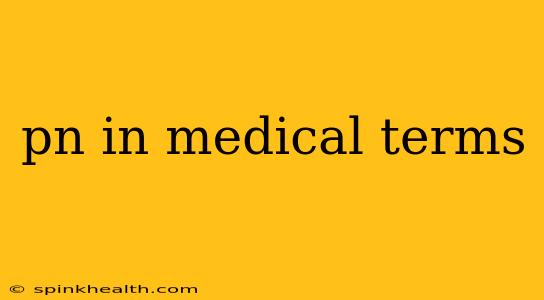The abbreviation "PN" in medical contexts almost always refers to peripheral neuropathy. This isn't some obscure medical jargon whispered only in hushed hospital tones; it's a surprisingly common condition affecting millions worldwide. Imagine this: your nerves, the intricate communication network that connects your brain and spinal cord to the rest of your body, are malfunctioning. That, in essence, is peripheral neuropathy. But the story doesn't end there. It's a complex condition with many facets, and understanding its nuances is crucial for effective management and treatment.
What is Peripheral Neuropathy?
Peripheral neuropathy is damage to the nerves outside of your brain and spinal cord—your peripheral nervous system. This damage can disrupt communication between your brain and the rest of your body, leading to a wide range of symptoms. Think of it like a tangled telephone wire – the signals become distorted or fail to reach their destination entirely. The result? A constellation of symptoms that can dramatically impact a person's quality of life.
What Causes Peripheral Neuropathy?
This is where things get interesting, and somewhat complex. There isn't one single culprit. Instead, several factors can contribute, often intertwining in a complex interplay. Let's explore some of the key players:
Diabetes: This is a major contributor. High blood sugar levels can damage the blood vessels that nourish nerves, leading to neuropathy. The longer someone has diabetes, and the poorer their blood sugar control, the greater the risk.
Autoimmune Diseases: Conditions like lupus and rheumatoid arthritis can trigger the immune system to attack healthy nerves. This autoimmune assault can result in significant nerve damage.
Alcohol Abuse: Excessive alcohol consumption can directly harm nerves and interfere with nutrient absorption, increasing the risk of PN.
Vitamin Deficiencies: A lack of crucial vitamins, particularly B vitamins, can disrupt nerve function.
Infections: Certain infections, like Lyme disease and shingles, can directly damage nerves or trigger an inflammatory response that leads to neuropathy.
Hereditary Conditions: Some forms of PN are inherited, meaning they're passed down through families.
Medications: Certain medications, particularly some chemotherapy drugs, can have neuropathy as a side effect.
Injuries: Trauma, such as nerve compression or damage from surgery, can also cause PN.
What are the Symptoms of Peripheral Neuropathy?
The symptoms of PN can vary widely depending on the type of neuropathy, its severity, and the nerves affected. Common symptoms include:
- Numbness and tingling: This is often described as a "pins and needles" sensation.
- Burning pain: This can be intense and debilitating.
- Sharp, stabbing pain: This pain can be sudden and unpredictable.
- Muscle weakness: This can lead to difficulties with walking, grasping objects, or performing fine motor tasks.
- Loss of reflexes: This is a common sign of nerve damage.
- Sensitivity to touch: Even light touch can be painful.
- Balance problems: This can increase the risk of falls.
- Digestive issues: In some cases, PN can affect the nerves controlling digestion, leading to constipation, diarrhea, or nausea.
How is Peripheral Neuropathy Diagnosed?
Diagnosing PN typically involves a thorough medical history, a neurological exam, and often some diagnostic testing. The doctor will assess your symptoms, conduct physical tests, and may order blood tests to rule out other conditions and check for underlying causes, such as diabetes or vitamin deficiencies. Nerve conduction studies (NCS) and electromyography (EMG) are often employed to assess the electrical activity of your nerves and muscles.
Can Peripheral Neuropathy Be Treated?
While a cure for PN isn't always possible, many treatments can effectively manage symptoms and improve quality of life. These include medications to manage pain, physical therapy to improve strength and mobility, lifestyle modifications, and in some cases, surgery. The specific treatment plan will depend on the underlying cause and the severity of the neuropathy.
What are the Long-Term Effects of Peripheral Neuropathy?
The long-term effects of PN can vary significantly depending on its severity and underlying cause. In some cases, the condition may be relatively mild and manageable, while in others, it can lead to significant disability. Prolonged PN can result in chronic pain, reduced mobility, and an increased risk of falls and injuries. Early diagnosis and treatment are crucial for minimizing long-term complications.
What are the Different Types of Peripheral Neuropathy?
Peripheral neuropathy isn't a monolithic condition. It encompasses several subtypes, each with its own specific characteristics and causes. These include:
- Diabetic neuropathy: Caused by diabetes.
- Alcoholic neuropathy: Associated with excessive alcohol use.
- Autoimmune neuropathy: Triggered by the immune system attacking nerves.
- Hereditary neuropathy: Inherited from parents.
- Toxic neuropathy: Caused by exposure to toxins.
- Traumatic neuropathy: Resulting from nerve injury.
- Inflammatory neuropathy: Caused by inflammation.
- Mononeuropathy: Affecting a single nerve.
- Polyneuropathy: Affecting multiple nerves.
This information is for general knowledge and informational purposes only, and does not constitute medical advice. It is essential to consult with a qualified healthcare professional for any health concerns or before making any decisions related to your health or treatment.

